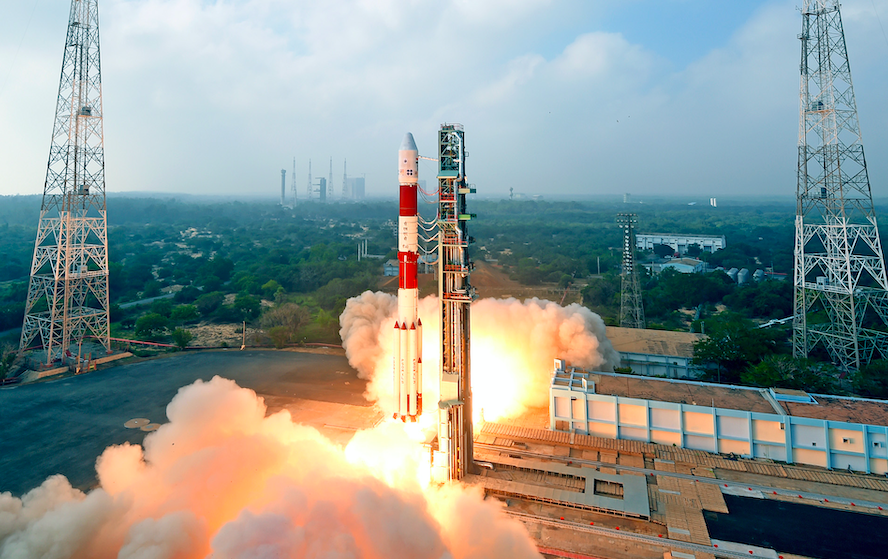When financial analyst turned aeronautical engineer, Srinath Ravichandran visited universities in California in 2016, he was surprised to see ready to be launched small satellites gathering dust.
After asking around, he learned that those satellites were waiting for their turn to get slots in rockets or satellite launchers that would take them to their designated orbits. The typical waiting period for small satellites, weighing anywhere under 500 kilograms, is about one year, Ravichandran told KrASIA. But what baffled him more was that their yearly maintenance cost was more than the development cost.
Over the last three decades, as satellites shrunk in size, space organizations began using large rockets to send multiple small satellites at once. These small satellites would be used for observing earth and space, communication, internet access, internet of things, and logistics, among other things.
However, this “ride-sharing” concept isn’t very efficient when it comes to space, Ravichandran said.
“It is like waiting at the bus stop for the right bus that will take you where you want to go. And, that’s not enough, you will have to make sure you are compatible with others; and that bus will have to fill up first,” he explained.
He said this translates into a lot of waiting time for small satellite manufacturers. To solve this problem, in late 2017, Ravichandran set up a space tech startup Agnikul that would build small rockets to exclusively launch individual small satellites.
“It would reduce the cost of sending these satellites by one-fourth and waiting time from over a year to two weeks,” he said. Agnikul’s flagship mobile satellite launcher Agniban will go under testing next year and be ready for the commercial launch by 2022.
Read this: Satellites become key vertical within China’s growing space sector
Ravichandran is a part of the new breed of passionate entrepreneurs who are betting their future on space tech, a complex segment, in terms of technical capabilities and industry regulations.
In the last three to four years, a few dozen new space tech startups have come up in the South Asian nation looking to build commercial solutions for a global clientele and tap the USD 350 billion global space market. With the Indian government opening up national space agency ISRO’s (Indian Space Research Organisation) resources for space tech firms earlier this year, the startups in the segment are now ready to aim for the stars.
A fortunate turn of events
Till about a few years back, Indian space tech startups struggled to get attention from venture capital (VC) firms. Entrepreneurs primarily had to invest their own money to get started, hoping they would figure out a revenue model to fuel their dream.
For instance, Earth2Orbit, which was founded in 2009 and was arguably India’s first space tech startup, pivoted to become an analytics company after offering launch advisory and launch procurement services to global satellite makers for seven years. In its new avatar, it provided actionable intelligence to organizations on climate and agriculture using Earth observation data. Earlier this year, it shifted focus to education, media, and outreach to promote innovation in space tech.
Similarly, eight-year-old Dhruva Space, which designs and develops satellites, found it hard to sustain operations without any external funding in its initial days and had to go into hibernation mode in 2015. Instead, its founders built a sensor technology company called Thybolt that offered sensor solutions for different sectors including shipping, aviation, agriculture, aquaculture, and defense. Cash flow from Thybolt reinvigorated Dhruva Space, which, in 2018, started consulting other companies on ways to improve their satellite missions for applications in fields like agriculture and mining.
It was only late last year that it raised angel funding of INR 50 million. The firm is now planning to build a fleet of satellites and a distributed network of ground stations, which are used to communicate with satellites that are in orbit.
Dhruva Space wasn’t the only one to raise money in 2019. While Angnikul raised half a million US dollars in seed round, satellite imagery startup Pixxel managed to get a check of USD 700,000 from GrowX Ventures, Techstars, and a few angels. Bellatrix, which manufactures satellite propulsion systems and nanosatellite launch vehicles, raised USD 3 million from IDFC-Parampara and StartupXseed, among others.
There were primarily two developments that got investors interested in Indian space tech startups. One, India incorporated NewSpace India Limited, a new entity to serve as a marketing arm for ISRO, with which the government wanted to increase the participation of the private sector in manufacturing launch vehicles for small satellites and transfer ISRO’s proprietary small satellite technology to these private players.
Secondly, American space technology giant SpaceX did pretty well and garnered global attention with the successful launch of two satellite constellations called Starlink that provided satellite internet services, among other things.
“It is not that people haven’t been investing in space tech,” said Vinod Keni, growth partner at early-stage VC firm Artha Venture Fund. “Space tech across the world, especially in the North American market, European market, and to a certain degree, the Chinese market, have attracted a significant amount of venture capital.”
“In India, it was predominantly regulatory concerns and restrictions that prevented a lot of private companies to step in and really start looking at innovation,” he added. “That’s changing now.”

In June, the government set up a new body called Indian National Space Promotion and Authorization Centre (IN-SPACe) that will enable private players, academic institutions, and research organizations to use ISRO’s infrastructure to carry out their space-related activities such as building rockets and satellites and launching them. Earlier this month, the government unveiled the draft policy for space-based communication that will regulate the commercial use of satellites, orbital slots, and ground stations.
Awais Ahmed, co-founder and chief executive of Pixxel, told KrASIA that the space tech firm has been in talks with ISRO since last month, which is helping them get satellite testing facilities and licenses. He said Pixxel is also looking at launching a constellation of microsatellites from India over the next few years.
“Earlier there was no clarity on regulations (on private participation in the space industry),” said Agnikul’s CEO Ravichandran. “Because of this announcement, we have seen investors’ interest increasing in space tech startups in the last six months.”
Some of the notable deals in the last two quarters include Pixxel raising a USD 5 million seed fund, Angikul closing a USD 3.25 million round, and Vesta Space, which offers small satellite platforms for commercial and scientific applications, landing a USD 10 million check.
Since Indian space firms have ISRO’s support, global companies are also more willing to work with them, he added.
Over the last half-century, ISRO has transitioned from being an underdog among the international space agencies to the globally respected space organization due to its unique approach of building inexpensive satellites for a wide range of use cases and undertaking space exploration missions.
Artha Venture’s Keni believes increased availability of risk capital and rising demand for commercial applications of space tech has helped investors make bets on the Indian space industry.
“The commercialization of space tech is happening at a much more rapid scale, which also means that all these companies will be in a position to provide returns,” he said.
Indian space tech startups also stand out because they have adopted ISRO’s mindset of building satellites and rockets at a fraction of the usual cost. This is due to the fact that the majority of these startups work with former ISRO scientists for guidance.
“It is the manner in which you approach the problem. That’s the mindset being set in place by ISRO,” said Ravichandran.
According to Pratip Mazumdar, co-founder and partner at Indian VC firm Inflexor Ventures, which has backed Bellatrix, the impact of being cost-effective is more prominent in space tech as it brings a huge discretionary effect to the entire cost of a launch, which is an expensive proposition in itself.
That Indian space tech startups are cost-efficient makes them very attractive for a lot of emerging economies that are looking at space as an option because it is now becoming affordable, Keni believes.

On a different trajectory
Indian space tech startups can broadly be classified into three categories—satellite and component manufacturers such as Dhruva and Astrome; rocket providers like Agnikul and Skyroot; and space tech application services providers like Pixxel and Kawa Space.
In their own way, most of these firms are making sure they have an edge over what’s available globally, besides being economical. Pixxel, for instance, plans to offer high quality, real-time satellite images that can provide information with deeper details than what existing satellite images would deliver.
Pixxel is planning to launch two microsatellites next year that will focus on getting data in areas such as agriculture, oil and gas, forest, and climate change. It already has about 20 government and private organizations on-board that are willing to try out its offerings. By 2023, Ahmed wants to put a constellation of 30 microsatellites to offer satellite imagery covering the entire globe.
“Satellites today are not able to detect Methane gas leakages and we will be able to do that. In the same way, the existing satellite data can help people with the health of the crop, but we can offer data on soil health parameters and moisture content in the area,” Ahmed explained. “It sounds counterintuitive but the cost per acre for satellite imagery is much cheaper than that for drones and IoT sensors.”
Inflexor’s Mazumdar said many space tech startups are looking at offering specific applications.
“In a lot of these cases, the go-to-market strategies are fairly well defined. And which is why the commercialization can also happen a lot more faster,” he said. “This has opened up a completely new field for VCs from an appetite perspective.”
Keni feels that Indian space startups are going to chart out a slightly different trajectory than existing global space firms.
“A lot of technology that space tech startups are using in India are already commercially proven. This means they won’t need a long period of time to test their hardware and can start getting on revenue-generating mode a lot faster,” he said.

